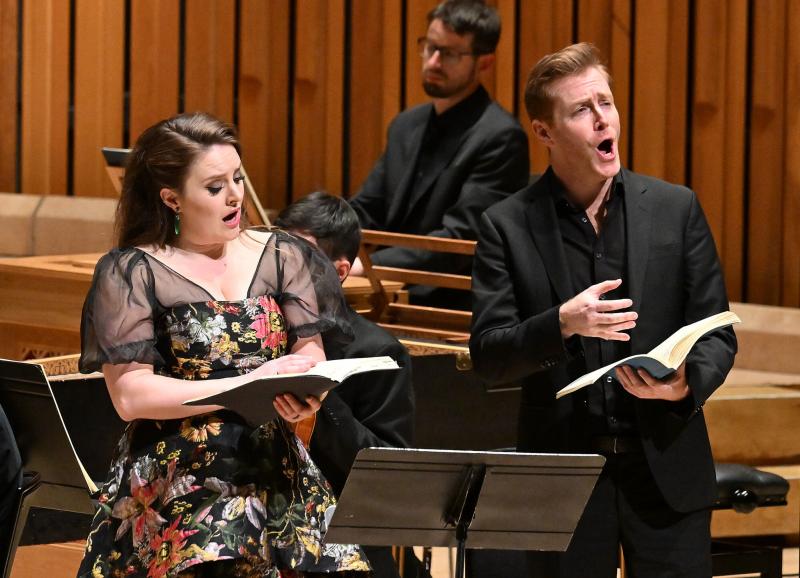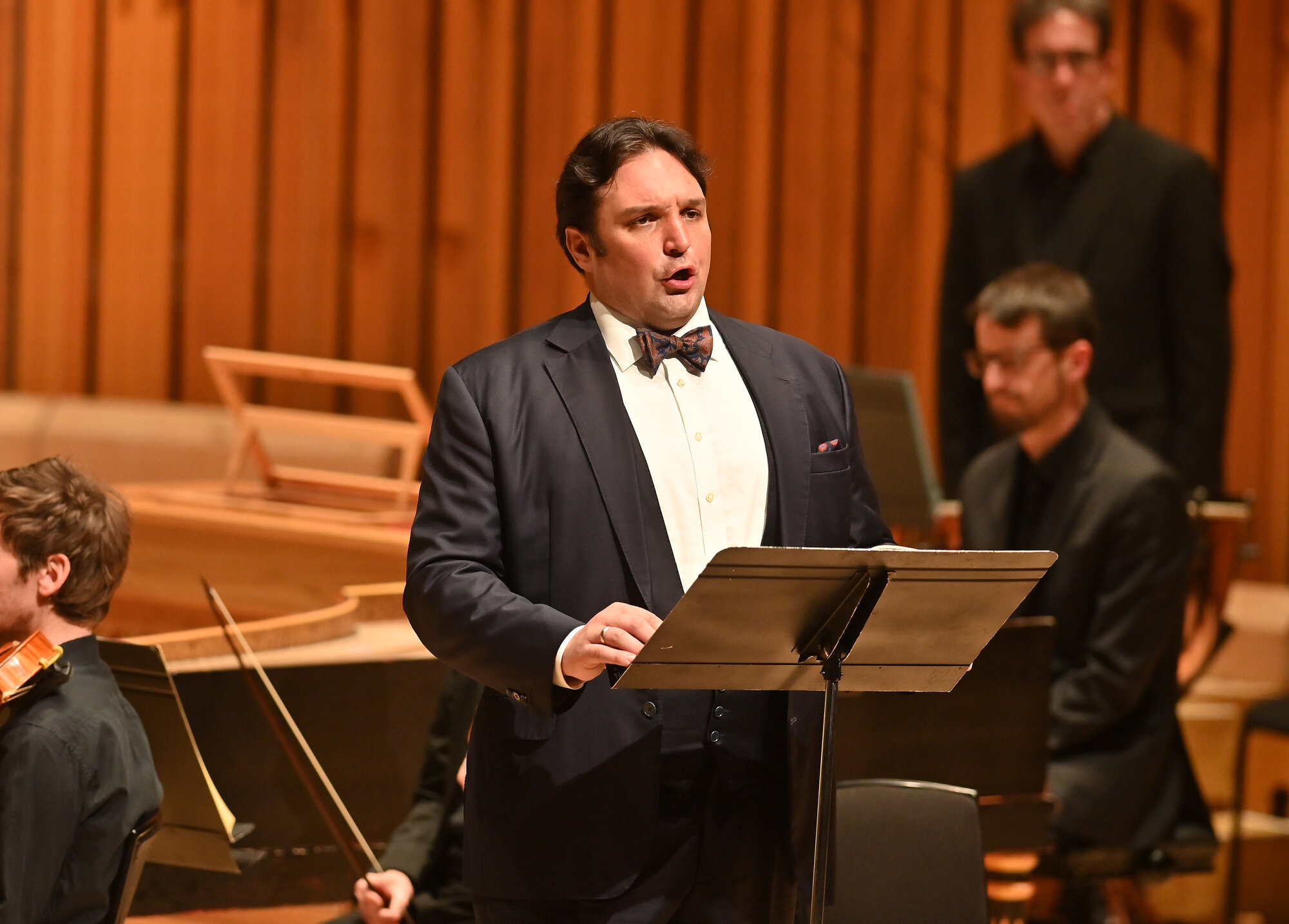Theodora, Arcangelo, Cohen, Barbican review - gloriously dark and sober | reviews, news & interviews
Theodora, Arcangelo, Cohen, Barbican review - gloriously dark and sober
Theodora, Arcangelo, Cohen, Barbican review - gloriously dark and sober
A chilly story gains plenty of human warmth in this vivid account

Handel’s Theodora – voluptuously beautiful, warm-to-the-touch music, yoked to a libretto of chilly piety about Christian martyrdom in 4th-century Rome. It’s a red rag to directors, and there’s a relief to seeing the oratorio in the concert hall, where the composer is cut free from a lot of acrobatic conceptual wriggling. And really, when it sounds like this, you need nothing more.
Back in 2018 Jonathan Cohen and his period group Arcangelo brought Theodora to the Proms. Distant and correct in the cavernous Royal Albert Hall, it never quite caught fire. Five years on and Cohen and leading lady Louise Alder are reunited at the Barbican, and suddenly arm’s length becomes close-up and the details – the end of a verse melting straight into the next without a breath, the flickering doubt in an ornament, a delayed resolution into a cadence – are absolutely in focus. And with a recording on its way, there’s a chance of getting closer still.
Christian aristocrat Theodora and Roman officer-turned-Christian-convert Didymus are a tricky pair. There’s a lot of talk of lilies and purity on his part, a lot of lofty heaven-gazing on hers, and a variant of the rom-com “No you hang up…”, except instead of ending a phone call they’re tussling over who gets to be executed, is almost unbearable. They’ll never be relatable, so instead Alder and countertenor Tim Mead imbue them with dignity and a sort of lit-from-within evangelical radiance. Alder’s soprano (the singer pictured above) is glossy as ever, and her control, giving us only a pin-hole first glimpse of the voice in “Angels ever bright and fair” before gradually releasing the full blaze as we move through Acts II, is absolute. Closing duet “Thither let our heart aspire” isn’t a resigned stepping back from life, here it’s a musical consummation, kindled by Cohen’s coaxing strings. Alder is well-matched in Mead’s stern purity of tone. The opening of his “The raptur’d soul” is a rebuke to the chattering violins, an extraordinary moment of time-stilling beauty.
Alder’s soprano (the singer pictured above) is glossy as ever, and her control, giving us only a pin-hole first glimpse of the voice in “Angels ever bright and fair” before gradually releasing the full blaze as we move through Acts II, is absolute. Closing duet “Thither let our heart aspire” isn’t a resigned stepping back from life, here it’s a musical consummation, kindled by Cohen’s coaxing strings. Alder is well-matched in Mead’s stern purity of tone. The opening of his “The raptur’d soul” is a rebuke to the chattering violins, an extraordinary moment of time-stilling beauty.
Anna Stephany’s Irene is the acolyte to Alder’s charismatic cult-leader, sober yet humane through “As with rosy steps”. The restraint of the whole Christian faction is brilliantly set off by Adam Plachetka’s storming Valens (pictured below) – a villain who announces himself in his first aria with all the tools of torture, and proceeds to loom with satisfying and unambiguous cruelty throughout. Only Stuart Jackson’s Septimius seems miscast, his baggy, characterful tenor confined rather than released by the lovely legato lines of “Descend, kind Pity”. Cohen, directing from the harpsichord, brings darkness to the fore. The unsettled opening of the Overture sets the tone for jagged edges and sombre grandeur – most striking when it seeps into unexpected place: the ravishing duet “To thee, thou glorious son of worth”, where strings grind and tug against the current of the voices, pulling them apart even as they come together for a moment.
Cohen, directing from the harpsichord, brings darkness to the fore. The unsettled opening of the Overture sets the tone for jagged edges and sombre grandeur – most striking when it seeps into unexpected place: the ravishing duet “To thee, thou glorious son of worth”, where strings grind and tug against the current of the voices, pulling them apart even as they come together for a moment.
Without the visual cues of staging it’s hard to bring clarity to a chorus who must constantly switch from Heathens to Christians and back again; but there was little doubt here. Diction was the driving force of really outstanding singing, carving everything cleanly, counterpoint impeccably balanced and phrased, and just a little more swing and outside-the-lines overspill from the Roman episodes, a little more vertical precision from the Christian ones.
Can you force belief on someone? Handel’s theme rings horribly and pertinently true. Theodora may conclude otherwise, but the score itself is enough to make a believer of anyone. With the forthcoming recording, Cohen seems likely to add plenty of new converts.
The future of Arts Journalism
You can stop theartsdesk.com closing!
We urgently need financing to survive. Our fundraising drive has thus far raised £49,000 but we need to reach £100,000 or we will be forced to close. Please contribute here: https://gofund.me/c3f6033d
And if you can forward this information to anyone who might assist, we’d be grateful.

Subscribe to theartsdesk.com
Thank you for continuing to read our work on theartsdesk.com. For unlimited access to every article in its entirety, including our archive of more than 15,000 pieces, we're asking for £5 per month or £40 per year. We feel it's a very good deal, and hope you do too.
To take a subscription now simply click here.
And if you're looking for that extra gift for a friend or family member, why not treat them to a theartsdesk.com gift subscription?
more Opera
 Tosca, Welsh National Opera review - a great company reduced to brilliance
The old warhorse made special by the basics
Tosca, Welsh National Opera review - a great company reduced to brilliance
The old warhorse made special by the basics
 BBC Proms: The Marriage of Figaro, Glyndebourne Festival review - merriment and menace
Strong Proms transfer for a robust and affecting show
BBC Proms: The Marriage of Figaro, Glyndebourne Festival review - merriment and menace
Strong Proms transfer for a robust and affecting show
 BBC Proms: Suor Angelica, LSO, Pappano review - earthly passion, heavenly grief
A Sister to remember blesses Puccini's convent tragedy
BBC Proms: Suor Angelica, LSO, Pappano review - earthly passion, heavenly grief
A Sister to remember blesses Puccini's convent tragedy
 Orpheus and Eurydice, Opera Queensland/SCO, Edinburgh International Festival 2025 review - dazzling, but distracting
Eye-popping acrobatics don’t always assist in Gluck’s quest for operatic truth
Orpheus and Eurydice, Opera Queensland/SCO, Edinburgh International Festival 2025 review - dazzling, but distracting
Eye-popping acrobatics don’t always assist in Gluck’s quest for operatic truth
 MARS, Irish National Opera review - silly space oddity with fun stretches
Cast, orchestra and production give Jennifer Walshe’s bold collage their all
MARS, Irish National Opera review - silly space oddity with fun stretches
Cast, orchestra and production give Jennifer Walshe’s bold collage their all
 Káťa Kabanová, Glyndebourne review - emotional concentration in a salle modulable
Janáček superbly done through or in spite of the symbolism
Káťa Kabanová, Glyndebourne review - emotional concentration in a salle modulable
Janáček superbly done through or in spite of the symbolism
 Buxton International Festival 2025 review - a lavish offering of smaller-scale work
Allison Cook stands out in a fascinating integrated double bill of Bernstein and Poulenc
Buxton International Festival 2025 review - a lavish offering of smaller-scale work
Allison Cook stands out in a fascinating integrated double bill of Bernstein and Poulenc
 Tosca, Clonter Opera review - beauty and integrity in miniature
Happy surprises and a convincing interpretation of Puccini for today
Tosca, Clonter Opera review - beauty and integrity in miniature
Happy surprises and a convincing interpretation of Puccini for today
 Hamlet, Buxton International Festival review - how to re-imagine re-imagined Shakespeare
Music comes first in very 19th century, very Romantic, very French operatic creation
Hamlet, Buxton International Festival review - how to re-imagine re-imagined Shakespeare
Music comes first in very 19th century, very Romantic, very French operatic creation
 Falstaff, Glyndebourne review - knockabout and nostalgia in postwar Windsor
A fat knight to remember, and snappy stagecraft, overcome some tedious waits
Falstaff, Glyndebourne review - knockabout and nostalgia in postwar Windsor
A fat knight to remember, and snappy stagecraft, overcome some tedious waits
 Salome, LSO, Pappano, Barbican review - a partnership in a million
Asmik Grigorian is vocal perfection in league with a great conductor and orchestra
Salome, LSO, Pappano, Barbican review - a partnership in a million
Asmik Grigorian is vocal perfection in league with a great conductor and orchestra
 Semele, Royal Opera review - unholy smoke
Style comes and goes in a justifiably dark treatment of Handelian myth
Semele, Royal Opera review - unholy smoke
Style comes and goes in a justifiably dark treatment of Handelian myth

Add comment